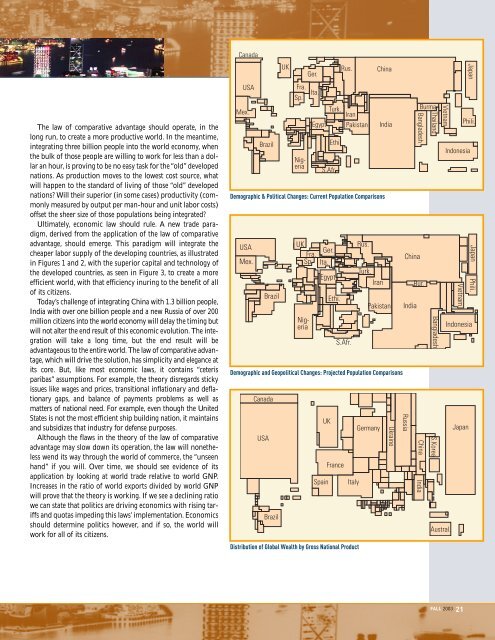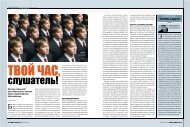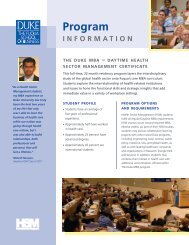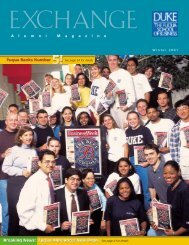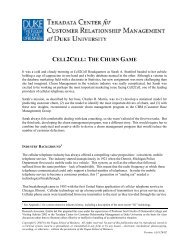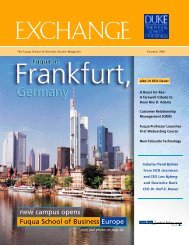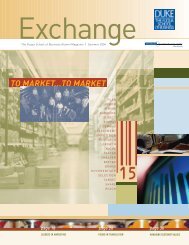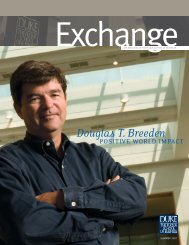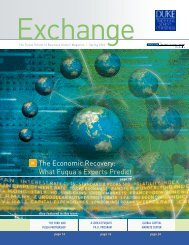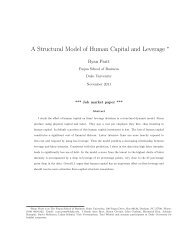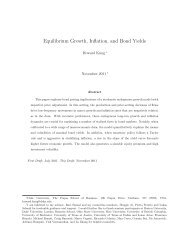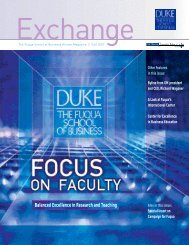Exchange Magazine, Fall 2003 - Duke University's Fuqua School of ...
Exchange Magazine, Fall 2003 - Duke University's Fuqua School of ...
Exchange Magazine, Fall 2003 - Duke University's Fuqua School of ...
You also want an ePaper? Increase the reach of your titles
YUMPU automatically turns print PDFs into web optimized ePapers that Google loves.
The law <strong>of</strong> comparative advantage should operate, in the<br />
long run, to create a more productive world. In the meantime,<br />
integrating three billion people into the world economy, when<br />
the bulk <strong>of</strong> those people are willing to work for less than a dollar<br />
an hour, is proving to be no easy task for the “old” developed<br />
nations. As production moves to the lowest cost source, what<br />
will happen to the standard <strong>of</strong> living <strong>of</strong> those “old” developed<br />
nations? Will their superior (in some cases) productivity (commonly<br />
measured by output per man-hour and unit labor costs)<br />
<strong>of</strong>fset the sheer size <strong>of</strong> those populations being integrated?<br />
Ultimately, economic law should rule. A new trade paradigm,<br />
derived from the application <strong>of</strong> the law <strong>of</strong> comparative<br />
advantage, should emerge. This paradigm will integrate the<br />
cheaper labor supply <strong>of</strong> the developing countries, as illustrated<br />
in Figures 1 and 2, with the superior capital and technology <strong>of</strong><br />
the developed countries, as seen in Figure 3, to create a more<br />
efficient world, with that efficiency inuring to the benefit <strong>of</strong> all<br />
<strong>of</strong> its citizens.<br />
Today’s challenge <strong>of</strong> integrating China with 1.3 billion people,<br />
India with over one billion people and a new Russia <strong>of</strong> over 200<br />
million citizens into the world economy will delay the timing but<br />
will not alter the end result <strong>of</strong> this economic evolution. The integration<br />
will take a long time, but the end result will be<br />
advantageous to the entire world. The law <strong>of</strong> comparative advantage,<br />
which will drive the solution, has simplicity and elegance at<br />
its core. But, like most economic laws, it contains “ceteris<br />
paribas” assumptions. For example, the theory disregards sticky<br />
issues like wages and prices, transitional inflationary and deflationary<br />
gaps, and balance <strong>of</strong> payments problems as well as<br />
matters <strong>of</strong> national need. For example, even though the United<br />
States is not the most efficient ship building nation, it maintains<br />
and subsidizes that industry for defense purposes.<br />
Although the flaws in the theory <strong>of</strong> the law <strong>of</strong> comparative<br />
advantage may slow down its operation, the law will nonetheless<br />
wend its way through the world <strong>of</strong> commerce, the “unseen<br />
hand” if you will. Over time, we should see evidence <strong>of</strong> its<br />
application by looking at world trade relative to world GNP.<br />
Increases in the ratio <strong>of</strong> world exports divided by world GNP<br />
will prove that the theory is working. If we see a declining ratio<br />
we can state that politics are driving economics with rising tariffs<br />
and quotas impeding this laws’ implementation. Economics<br />
should determine politics however, and if so, the world will<br />
work for all <strong>of</strong> its citizens.<br />
Demographic & Political Changes: Current Population Comparisons<br />
Demographic and Geopolitical Changes: Projected Population Comparisons<br />
Distribution <strong>of</strong> Global Wealth by Gross National Product<br />
FALL <strong>2003</strong> 21


